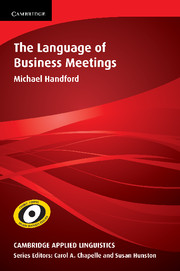Book contents
- Frontmatter
- Contents
- Series editors' preface
- Acknowledgements
- Transcription conventions
- 1 CANBEC: Corpus and context
- 2 Background: Theory and methodology
- 3 The business-meeting genre: Stages and practices
- 4 Significant meeting words: Keywords and concordances
- 5 Discourse marking and interaction: Clusters and practices
- 6 Interpersonal language
- 7 Interpersonal creativity: Problem, issue, if, and metaphors and idioms
- 8 Turn-taking: Power and constraint
- 9 Teaching and learning implications
- Appendix
- Index
9 - Teaching and learning implications
Published online by Cambridge University Press: 05 April 2013
- Frontmatter
- Contents
- Series editors' preface
- Acknowledgements
- Transcription conventions
- 1 CANBEC: Corpus and context
- 2 Background: Theory and methodology
- 3 The business-meeting genre: Stages and practices
- 4 Significant meeting words: Keywords and concordances
- 5 Discourse marking and interaction: Clusters and practices
- 6 Interpersonal language
- 7 Interpersonal creativity: Problem, issue, if, and metaphors and idioms
- 8 Turn-taking: Power and constraint
- 9 Teaching and learning implications
- Appendix
- Index
Summary
Although the contribution of corpus studies to developments in various fields of applied linguistics over the past two decades has been profound, applying findings from corpus research in the development of teaching and learning materials is neither straightforward (Lee and Swales, 2006), nor universally embraced (Widdowson, 2000; Cook, 1998). These issues, combined with the tendency of many to steer clear of research that seems incongruous with accepted pedagogical content and practices, help explain why corpus texts and corpus findings have not been widely exploited in much language teaching material over the same 20-year period. While this situation is gradually changing (O'Keeffe et al, 2007), such advances in business language teaching materials, particularly in relation to spoken discourse, are still slow (Koester, 2010).
According to Koester (2010), research into business discourse can inform business teaching and learning and therefore business teaching materials in addressing the following five areas:
The different goal orientations of business discourse as compared to everyday communication
The appropriate and frequent vocabulary used in business, particularly in terms of clusters, and how such language is different from everyday English
The ways workplace genres are constructed
The importance of problem-solving at work and the range of skills needed to achieve it
The importance of relational as well as transactional aspects of communication
- Type
- Chapter
- Information
- The Language of Business Meetings , pp. 245 - 264Publisher: Cambridge University PressPrint publication year: 2010



